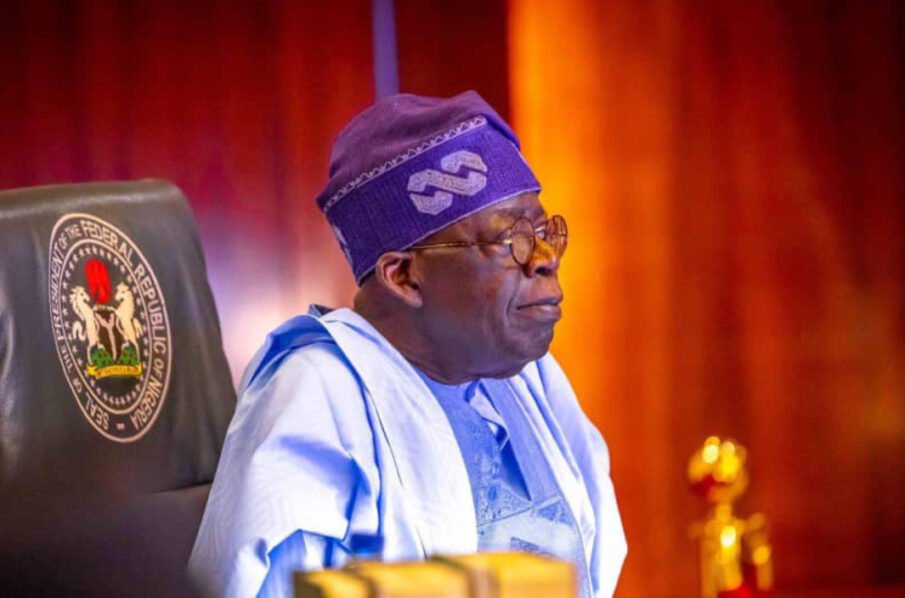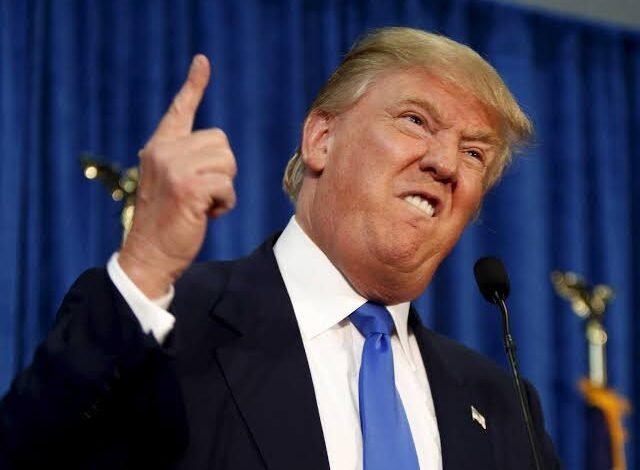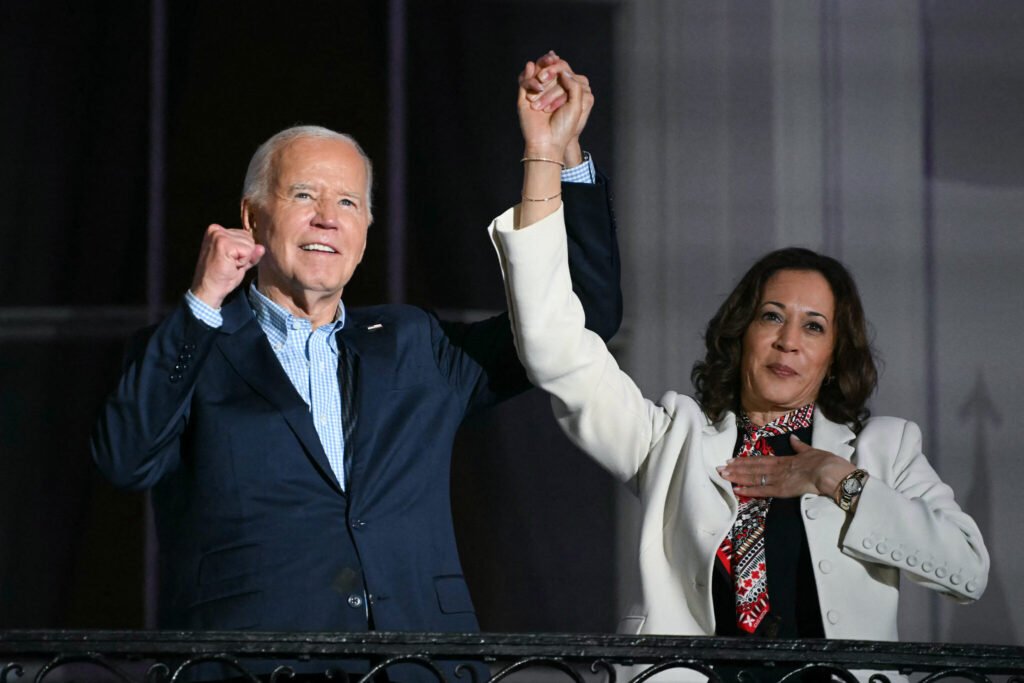Basil Odilim
Kamala Harris is officially the Democratic presidential nominee, but Donald Trump continues to describe her elevation to the top of her party’s ticket as “unconstitutional” and accuses her of participating in a “coup.” — CNN
Kamala Harris, who Trump has disparaged, is facing unprecedented attacks. “Trump isn’t just losing the election. He’s losing his mind,” says USA Today.
Trump’s insults against Harris, including comments like “For nearly four years Kamala has crackled [cackled] as the American economy has burned,” reflect his inflammatory rhetoric.
Bernard Goldberg contends that “Donald Trump needs an intervention. He needs his friends and political allies to lock him in a room, sit him down, look him in the eye and tell him that if he doesn’t change his ways, he’s probably going to lose in November.” #BernardGoldberg
We anticipated that this moment would eventually arrive. Given the gravity of the situation, there are valid arguments for delaying Trump’s sentencing until after the election or scheduling it just before. The U.S. Constitution, meticulously crafted by our founding fathers, firmly establishes that no citizen—regardless of status or position—is above the law. This principle is a cornerstone of the American Republic, ensuring that justice remains blind and impartial.
Trump’s actions and subsequent legal battles appear to challenge the very foundation of this constitutional principle. Despite the respect and deference afforded to him as a former president, he is not exempt from accountability. The timing of his sentencing is not just a matter of legal procedure but also one of profound national significance, raising questions about the integrity of the electoral process, the rule of law, and the future of democratic governance in the United States.
We are only beginning, and Trump is already feeling the heat. The strategic decision to replace Biden with Harris immediately after Trump’s confirmation as the Republican presidential nominee amid his insults against Biden and the Democrats marked the start of a complex political chess game. This move can be likened to the biblical analogy of serving the best wine last. Just as the master of the feast praised the host for saving the best wine for later, this strategy aligns with military principles advocated by figures like Sun Tzu, Alexander the Great, and Napoleon, who emphasized the importance of decisive actions at critical moments. This is not a coup but a carefully planned maneuver to optimize effectiveness.
Similar to how Congress acted to limit the presidency to two terms following Franklin D. Roosevelt’s unprecedented four-term tenure, there must be corresponding measures to address the problem of endless inflammatory rhetoric in modern election campaigns—an issue exacerbated by Trump. Just as the 22nd Amendment aimed to prevent excessive concentration of power in the presidency, Congress should consider establishing regulations to curb incendiary language and ensure campaigns remain civil. This step is crucial given Trump’s relentless inflammatory rhetoric, which undermines constructive debate and erodes civil discourse.
Inflammatory statements have increasingly characterized modern election campaigns, often overshadowing substantive debate and damaging civil discourse. While such statements fall under free speech protections, the First Amendment does not shield all forms of expression. The U.S. Constitution safeguards a wide range of speech, including offensive or controversial expressions, based on the belief that a free society must allow diverse opinions, even those that provoke or offend.
However, election campaigns present unique challenges. The U.S. Supreme Court has identified certain types of speech that are not protected due to their potential harm to public safety and social order. Speech that incites imminent lawless action or constitutes true threats—where the speaker intends to provoke unlawful behavior or communicates a serious intent to commit violence—falls outside protected speech.
Election campaigns should prioritize constructive dialogue over divisive rhetoric. The use of “fighting words” intended to incite violence and forms of obscenity or defamation that damage reputations or violate community standards, undermine the integrity of the electoral process, and threaten democratic governance.
Fostering a civil approach to election campaigns ensures that debates focus on ideas, policies, and the future of the nation rather than on rhetoric that deepens societal divisions. Balancing free expression with the need to maintain social order and protect individuals is an ongoing challenge in democratic societies. Promoting civility in election campaigns is essential for upholding democratic principles and ensuring that all voices are heard and respected.

Ultimately, the judgment on Trump’s case will resonate deeply within American society, shaping the nation’s future for years to come. Whether his sentencing occurs before or after the election, the manner in which America handles this situation will reflect the American commitment to the rule of law and the integrity of its democratic processes.











8 Comments
Kamala Harris’s economic plan is the worst in the history of the US.
Dangerous and madness. Communism is back in the most capitalist country in the world.
Terrible Terrible Terrible.
How will she get it approved in the US Parliament?
Impossible.
It will never happen.
This is a Bernie Sanders type of economic policy: her polling numbers will crash tonight.
Madness and Crazy.
Dear Dr. Arc I. O
First of all, the US legislative body is called Congress, not Parliament. The United States operates under a different system of government.
It’s important to distinguish between economics and the economy. Economics is what’s taught in colleges and universities—a more theoretical and analytical discipline. On the other hand, the economy is about the reality on the ground, the day-to-day experiences of people living through these issues. Those who live the problem are often best equipped to articulate their needs, which is the essence of discussing the economy. When you and I discuss these issues as outsiders, we’re talking about economics.
Kamala Harris’s father, Donald J. Harris, is a well-regarded economist, which suggests that economic issues are likely familiar territory for her. However, without specific references to her plan, it’s challenging to engage deeply with the arguments you’ve raised.
Your comments remind me of a man from Ihiala, who growing up, we popularly nicknamed him, “Radio Biafra,” who often spoke passionately but sometimes without verifying his sources. He’d mention the BBC, but when asked for details, he’d admit he hadn’t confirmed the information.
It’s always helpful to have clear references and details when discussing such important topics to ensure the discussion is well-grounded.
I understand you are campaigning for Kamala Harris.
I understand. Your prerogative.
Nevertheless, I will never support the Democrats at all.
I remain an unrepentant Republican or Conservative.
Politically, I am a Conservative. Never a liberal at all.
My life philosophy is:
Work as much as you can, and whatever rewards that come should be yours. You spend it as you want.
According to Regan: “The government is the problem and not the people.”
Dear Dr. Arc Okpanum,
Thank you for your response regarding Kamala Harris’s economic plan. While I understand your concerns about it potentially aligning with “communism,” I’d like to offer some reflections on Reaganomics, which you have praised.
Reaganomics, with its emphasis on reducing government intervention, cutting taxes, and deregulating industries, played a significant role in shaping the global economy. One notable impact was the shift of many Western manufacturers to Asia, particularly China, where lower labor costs and fewer environmental regulations made production more attractive. This shift contributed to job losses and economic challenges in Western countries, as manufacturing jobs moved abroad.
During the same period, the US and the Soviet Union focused heavily on military spending and building their military-industrial complexes. In contrast, China invested strategically in becoming a global manufacturing hub, quietly positioning itself as a major player in the global economy. This shift in focus allowed China to become a leading producer of goods and a critical part of the global supply chain.
This contrast highlights how different economic strategies and priorities can shape global economic dynamics. While the US and Soviet Union concentrated on military expansion, China’s focus on manufacturing infrastructure and economic development enabled it to grow rapidly and influence global markets.
The debate over economic policies and their broader implications is complex. Each approach has its strengths and challenges, and understanding these impacts is essential for evaluating any economic plan.
I appreciate the opportunity to discuss these important issues and look forward to further dialogue on how different strategies influence both domestic and global economies.
I understand your concerns about the middle class.
However, I remain an unrepentant Republican or Conservative.
Politically, I am a Conservative. Never a liberal at all.
My life philosophy is:
Work as much as you can, and whatever rewards that comes: should be yours. You spend it as you want.
If this philosophy is adopted by all, then the middle class will progress significantly.
According to Regan: “The government is the problem and not the people.”
I supported and still support this simple common sense economic philosophy.
Imagine Harris’s economic policy of government building houses for all: absurd and complicated. Whenever the government gets involved in the housing industry, it destroys the sector.
Look at the mess happening in the public sector housing industry in the UK a total disaster.
NHS in the UK is another terrible public health service system.
Go and get a simple dental appointment through the public sector dental services in the UK.
You will wait for months if not years.
Harris is looking at a very big government in the US. The question is, how will she get it over the line with the divided Congress.
Let us wait and see how her plan unfolds.
Not to talk about her inappropriate and complex policy on reducing the cost of food items.
How will she get this controversial policy approved? Insane to say the least.
Dear Dr. Okpanum,
Thank you for sharing your thoughts on the middle class and your political philosophy. I understand and respect your conservative viewpoint, particularly the emphasis on personal responsibility and the belief that individuals should enjoy the fruits of their labor without undue government interference.
However, I would like to offer a different perspective on the role of government in fostering an inclusive economy, one that has historically yielded substantial economic growth and social stability.
One of the most significant examples of this is Franklin D. Roosevelt’s New Deal, which introduced a range of social welfare programs in response to the Great Depression. These programs, including Social Security and unemployment insurance, were designed to provide a safety net for the most vulnerable and to stimulate economic activity by putting money directly into the hands of those who needed it most. The result was not just economic recovery, but an unprecedented period of economic growth that solidified Roosevelt’s position as the only U.S. president to be elected to four terms.
Roosevelt’s policies showed that when people’s basic needs—such as housing and food—are secured, they are more likely to contribute positively to society and the economy. When citizens are not constantly worried about survival, they can focus on innovation, education, and other activities that drive national competitiveness and prosperity.
China’s approach is a modern example of this principle in action. The Chinese government has invested heavily in public housing, ensuring that a significant portion of its population has access to affordable living conditions. Additionally, by keeping food prices low and accessible, the government has been able to maintain social stability and support a rapidly growing middle class. This focus on basic needs has been a cornerstone of China’s impressive economic rise.
Your concerns about government overreach in sectors like housing and healthcare are valid and shared by many. However, the failures of systems like the NHS in the UK are not necessarily indicative of the concept of public welfare itself but rather of how these systems are managed and funded. In countries where these systems are adequately supported, they can provide immense value without stifling private sector growth.
The key is balance. A thriving middle class, which you advocate for, can indeed be achieved through hard work and personal responsibility. But ensuring that everyone has access to basic necessities like housing and food can create a more stable and prosperous society overall. This, in turn, benefits the entire economy—including those who work hard and accumulate wealth—by expanding the consumer base and reducing social unrest.
While economics often focuses on broad theories and principles, what Harris, the daughter of one of America’s most respected economists, is doing is economy—dealing with the realities on the ground. Tax breaks for the super-rich lead to wealth concentration, reducing government revenue and diminishing public services that the middle class and poor rely on.
This results in economic stagnation, stifling opportunities for the broader population, while the rich continue to accumulate wealth. The disparity fuels social unrest and creates a “dog-eat-dog” society, where inequality deepens, and the middle class struggles, making the poor even poorer. Balanced tax policies are essential to prevent this cycle and promote a more equitable and prosperous society.
Wealth, when properly redistributed through well-thought-out policies, can fuel both trickle-down and trickle-up economic growth, thereby enhancing national well-being. By growing the grassroots economy, we create a more robust middle class, which is essential for the long-term health of any nation.
I appreciate your insights and look forward to further discussions on how best to balance these economic philosophies for the benefit of all.
Best regards,
Who’s this guy @Dr. I.O? I don’t think he should be taken seriously. He’s simply emotional! His misplaced support and love for Trump make it impossible to be rational when discussing America’s politics.
Dear Jude,
Thank you for your thoughtful response. It’s reassuring to know that we share a common understanding of the importance of fairness and justice in our society. I also appreciate your stance against the criticism directed at Dr. I.O, particularly considering the privileged position from which he speaks.
Dr. I.O, like many who have achieved a certain level of success, often speaks from a place of privilege that can make it difficult to fully grasp the challenges faced by those who are less fortunate. While his emphasis on personal responsibility and limited government might come from a sincere belief in the power of individual effort, it’s essential to acknowledge that not everyone starts from the same place. The privileged often have access to resources, networks, and opportunities that the average person simply does not.
Critics of Dr. I.O may feel frustrated by what they perceive as a lack of empathy or understanding for those who struggle daily just to meet their basic needs. It’s easy to advocate for smaller government and personal responsibility when you’ve never had to worry about where your next meal is coming from or how you’ll afford a place to live. This is not to diminish his accomplishments but rather to highlight that the realities of life for many people are vastly different from those experienced by the privileged.
Furthermore, the economic policies known as “Reaganomics,” which Dr. I.O might admire, have had long-term consequences that deepened the divide in American society. While these policies aimed to reduce government intervention and promote free-market principles, they also led to a significant shift in wealth distribution. Tax cuts for the wealthy and deregulation created an environment where the rich could accumulate even more wealth, often at the expense of the middle class and poor.
One of the most critical outcomes of Reaganomics was the offshoring of manufacturing jobs, as companies sought to maximize profits by moving production to countries with lower labor costs. This shift led to the decline of American manufacturing, particularly in the industrial heartland, and triggered China’s eventual emergence as the world’s manufacturing hub. While this move was beneficial for corporate profits, it devastated many American communities, leading to job losses and economic decline.
The offshoring trend, coupled with the intense military spending of the Cold War era, where the U.S. and the then USSR competed in funding their military-industrial complexes, further strained the American economy. Instead of investing in infrastructure, education, and social programs that could have strengthened the middle class, vast sums were funneled into defense, benefiting a small sector of the economy while neglecting broader societal needs.
As we both recognize, the wealth accumulated by the privileged is not always earned through purely fair means. The system often favors those who already have wealth, providing them with tax breaks, legal advantages, and other benefits that help them maintain and grow their fortunes. This creates a cycle where the rich get richer while the poor are left to struggle. Blaming the poor for their situation without acknowledging these systemic advantages is not just unjust—it perpetuates inequality.
It’s crucial for people like Dr. I.O to understand that advocating for government intervention to support the less fortunate isn’t about punishing success or promoting dependency. It’s about ensuring that everyone has a fair shot at success, regardless of their background. When the privileged recognize their role in maintaining a fair and just society, they can contribute to policies that uplift everyone, not just those at the top.
In conclusion, while it’s important to respect Dr. I.O’s views, it’s equally important to challenge the notion that success is purely a result of individual effort without considering the broader social and economic context. By advocating for fairness and justice, we can create a society where the benefits of success are shared more equitably, and everyone has the opportunity to thrive.
Best regards